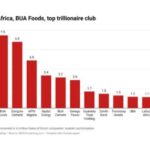Dangote Petroleum Refinery has announced an increase in the price of Premium Motor Spirit (PMS), commonly referred to as petrol, to ₦955 per litre at the loading gantry. This adjustment follows the continuous rise in the global benchmark for oil, Brent crude.
A statement from the refinery, reviewed by BusinessDay, revealed the updated pricing structure on Friday. The new rate reflects a 6.17% increase from the discounted holiday rate of ₦899.50 per litre offered to bulk buyers in December.
Under the revised pricing framework, marketers purchasing between 2 million and 4.99 million litres of petrol will pay ₦955 per litre, while those buying 5 million litres or more will enjoy a slightly reduced rate of ₦950 per litre.
Market Dynamics Driving the Hike
The price adjustment comes amid a surge in Brent crude prices, which as of today, stands at $81.11 per barrel. West Texas Intermediate (WTI), another key benchmark, is trading at $79.08 per barrel. Both have recorded over a 1% increase in trading since market opening.
Global oil prices have been influenced by supply disruptions due to U.S. sanctions on Russian oil producers and tankers. Additionally, optimism surrounding a potential recovery in demand—spurred by anticipated U.S. interest rate cuts—has further supported crude prices.

“Concerns over supply constraints and expectations of higher demand are fueling the uptick in crude markets,” said Toshitaka Tazawa, an analyst at Fujitomi Securities, in a statement to Reuters.
Operational Implications
The refinery attributed the price increase to higher costs associated with refining and distribution, stemming from fluctuations in the crude oil market.
The updated pricing structure will take effect from 5:30 PM today, impacting bulk marketers and distributors across Nigeria.
This adjustment reflects the broader challenges in the oil sector, where global market trends directly influence local pricing strategies. With oil prices showing no signs of easing, further changes in the PMS market could be on the horizon.
Marketers and stakeholders are advised to plan their purchases accordingly, as these developments highlight the interconnected nature of global and domestic oil markets.


